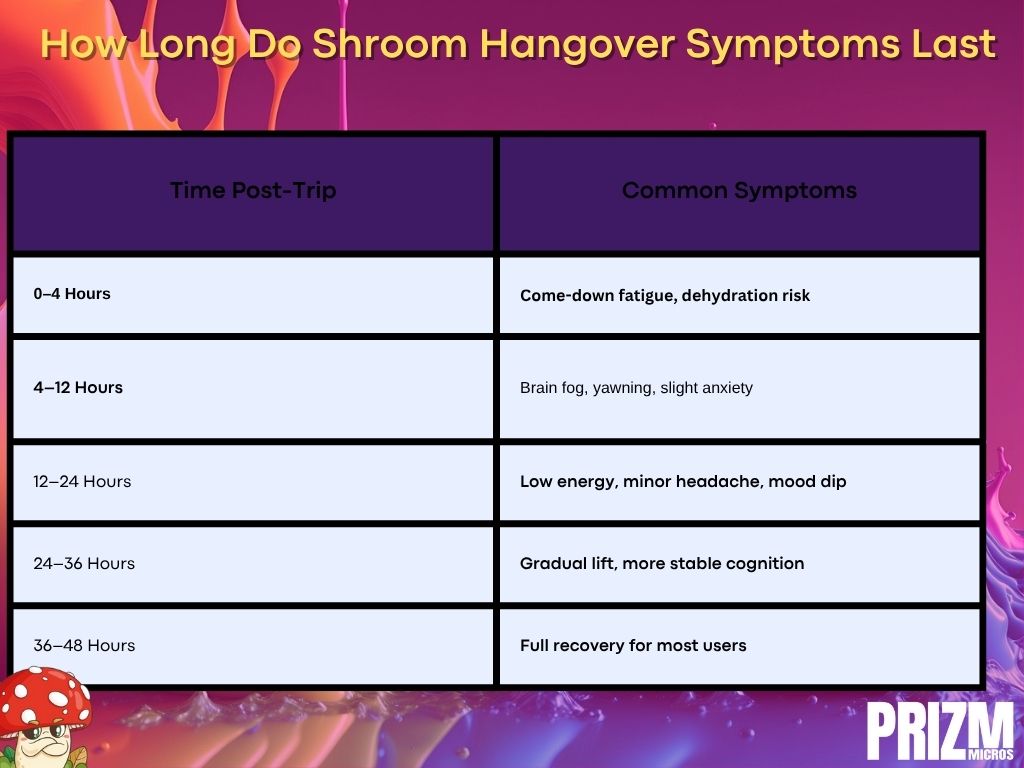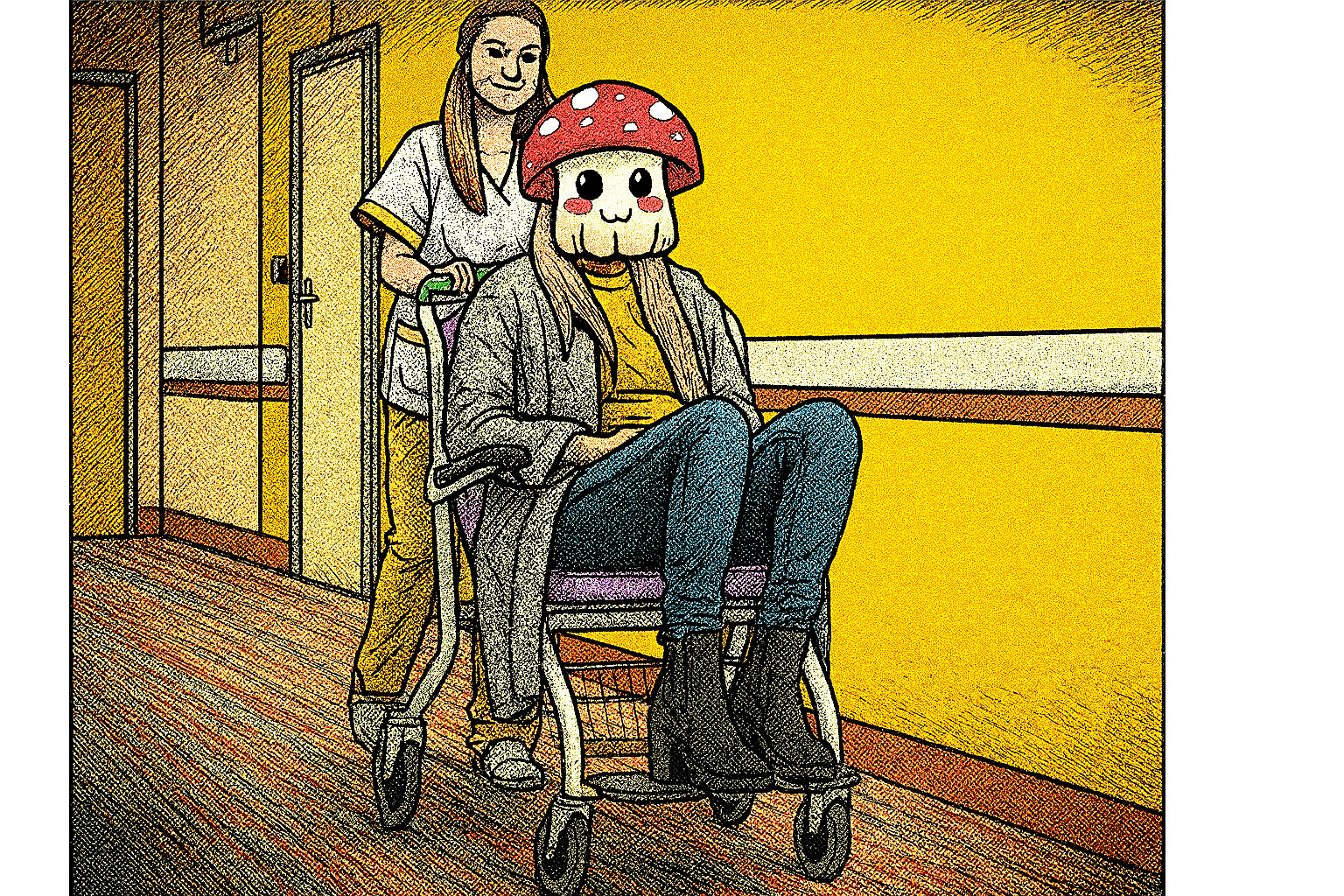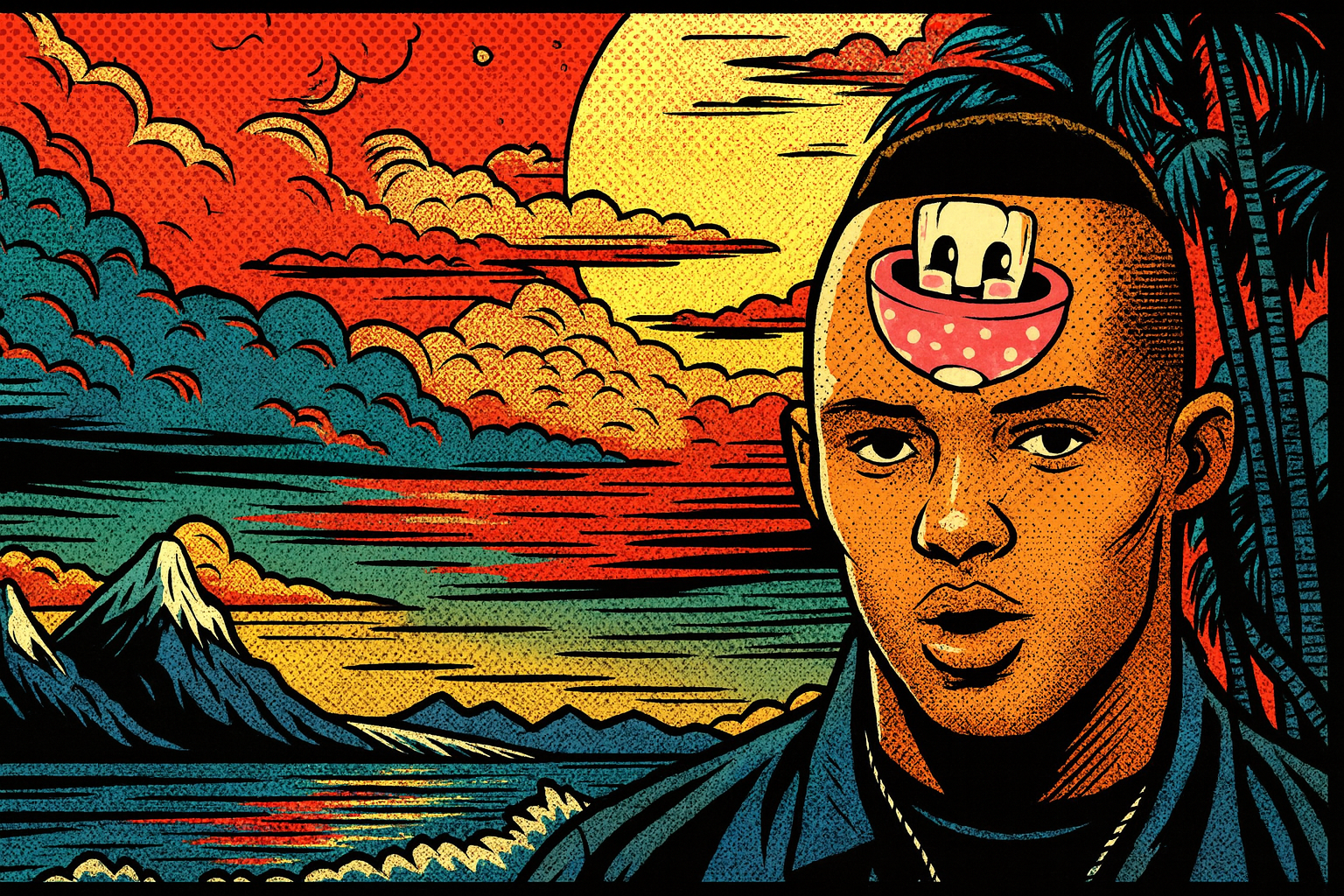A shroom hangover is the lingering fatigue, brain fog, headache, or emotional drain some users feel the day after taking psychedelic mushrooms. It’s often caused by serotonin fluctuations, dehydration, or poor sleep, and while not dangerous, it can disrupt focus and mood. Recovery typically includes hydration, rest, and nutritional support.
Quick Facts (For Top-of-Page or Summary Module)
- What is it? A shroom hangover is next-day fatigue, brain fog, or headaches after a mushroom trip.
- Why it happens: Serotonin depletion, dehydration, poor sleep, or high doses.
- How long does it last? Typically 12–36 hours; varies by dose, hydration, and sleep quality.
- Fastest fixes: Hydrate, eat nutrient-rich foods, use 5-HTP or magnesium, and rest.
- Is it dangerous? Usually not, but if symptoms persist or worsen, seek medical advice.
- Can you prevent it? Yes. Prep with hydration, avoid alcohol, and rest post-trip.
- Legal options: Many users report fewer hangover effects from legal, precisely dosed mushroom blends like Prizm’s snackable psychedelics.
Shroom Hangover Guide: What It Is, Why It Happens & How to Bounce Back
What Is a Shroom Hangover?
A shroom hangover is that groggy, foggy, sometimes headachy aftermath that can hit you the day after a mushroom trip. It’s not universal, but when it shows up, it’s unmistakable. Think: brain fog, fatigue, low mood, or that “off” feeling that makes even simple tasks feel like a trek.
This isn’t the same kind of hangover you get from alcohol. It’s not about toxins or dehydration alone; it’s your body and brain recalibrating after a powerful shift in perception. And it doesn’t just happen with heavy trips. Some people report this kind of sluggishness even after moderate doses or microdosing.
That next-day crash might leave you wondering: Did I do something wrong? Is this normal? How can I avoid this next time?
Let’s get into the science and the strategy.
Why It Happens (The Real Causes)
While research on shroom hangovers is still catching up to lived experience, here’s what we know (and what experienced psychonauts agree on):
1. Serotonin System Reset
Psilocybin interacts with serotonin receptors, particularly 5-HT2A. After a trip, your brain may temporarily downregulate its response to serotonin, leading to a dip in mood, focus, or energy. It’s not damage. It’s a temporary recalibration.
2. Dehydration & Physical Stress
Even if you weren’t dancing for hours, mushrooms can subtly dehydrate you. Add that to disrupted sleep or skipped meals, and you’ve got a recipe for feeling wrecked.
3. Sleep Disruption
Trips often last 4–6 hours, with a come-down that pushes into the night. If you didn’t fully rest afterward, your brain didn’t get time to process and reset.
4. Nutrient Depletion
Like with any intense experience, your body may burn through magnesium, B vitamins, and other mood-regulating nutrients faster than usual.
5. Set, Setting & Emotional Exhaustion
Even a beautiful journey can leave you emotionally wiped if it brought up big feelings. Especially for solo trips or first-timers.
How Long Does a Shroom Hangover Last?
In most cases, a shroom hangover clears up within 12 to 24 hours, but that depends on dose, mindset, physical health, and how you recover.
Typical Timeline:
- 0–6 hours post-trip: You may feel drained but still mentally stimulated.
- 6–12 hours: Fog, low energy, and emotional flatness tend to set in.
- 12–24 hours: Most people return to baseline, especially with sleep, hydration, and recovery support.
- 24–48 hours: For high-dose or emotionally intense trips, residual fog or body heaviness might linger into the second day.
And for microdosers? While most don’t report hangovers, stacking too often without breaks, or pairing with poor sleep and stress, can still leave you with “microburnout.”
Fast Recovery: What to Do After a Shroom Hangover
Here’s the part you’re probably here for: the fix. While there’s no one-size-fits-all hangover cure, these proven strategies help reset faster:
Rehydrate Intelligently
- Electrolytes > plain water: Think coconut water, LMNT, or magnesium blends.
- Replenish what tripping depleted, especially if you forgot to eat or drink during your experience.
Refeed Your Brain
- Opt for foods rich in tryptophan (bananas, eggs, oats) to support natural serotonin production.
- Add complex carbs to help shuttle nutrients into the brain.
- Supplement smartly: B-vitamins, magnesium, and 5-HTP (if you’re not on SSRIs).
Move Gently, Then Rest
- A light walk can help clear the fog.
- Follow with a solid nap or early night’s sleep, skip the screens, and let your nervous system settle.
Consider Functional Support
- Adaptogens like Rhodiola or Ashwagandha can balance stress hormones.
- Legal microdosing stacks (like Prizm’s “one for focus” blend) support clarity without overwhelm.
Can You Prevent a Shroom Hangover?
Short answer? Not always, but you can drastically reduce the chances.
Prevention Starts Before the Trip
The way you prep your body, your space, and your mind plays a massive role in how you feel the next day.
Here’s what works:
1. Hydrate Pre-Trip
- Think of it like pre-gaming for your brain.
- Drink water with electrolytes 2–3 hours before dosing.
- Avoid alcohol, caffeine, or anything that dehydrates.
2. Fuel Your Body Wisely
- Eat a light, nutrient-dense meal before your trip, something like quinoa, veggies, avocado.
- You want stable blood sugar without a heavy digestive load.
3. Supplement Strategically
- Magnesium can ease muscle tension and support neurotransmitter balance.
- B-complex vitamins help rebuild post-trip.
- If it’s your first time or you’re sensitive, consider a light adaptogen like Rhodiola.
4. Set, Setting… and Sleep
- Create a calming environment.
- Set aside time to rest after, especially if tripping into the night.
- Skipping sleep is the fastest way to guarantee a crash.
5. Choose the Right Stack
- Some blends spike harder than others.
- Legal options like Prizm’s snackable psychedelics are designed to be easier on the body and clearer on the mind.
Shroom Hangover vs. Afterglow: What’s the Difference?
One leaves you inspired. The other leaves you horizontal. Let’s break it down.
Afterglow: The Good Stuff
- Think of it as emotional clarity meets quiet awe.
- You might feel:
- Calm
- Grateful
- Emotionally open
- Creatively energized
- It usually follows a well-integrated trip with enough rest and hydration.
- Some compare it to a runner’s high, but for the soul.
Hangover: The Mush Slump
- This is the part no one posts about.
- You might feel:
- Mentally foggy
- Physically drained
- Emotionally flat
- Headachy or dehydrated
- It’s more likely if you didn’t sleep, hydrate, or dosed heavily without prep.
How to Tell Which You’re In

Can You Shift a Hangover Into an Afterglow?
Sometimes. Hydration, a nature walk, light stretching, or journaling can help flip the script.
How Long Do Shroom Hangover Symptoms Last?
The short answer? It depends, but most people feel back to baseline within 12 to 36 hours.
Let’s break it down based on typical experiences, dosage, and recovery practices.
Typical Timeline (Macrodose Trip)

Microdose “Hangover” Window
While rare, some users report post-microdose fatigue or irritability, especially if:
- They’ve been stacking doses without breaks
- They’re sensitive to serotonin shifts
- They mix with other substances like caffeine or alcohol
Duration: Usually resolves within 4–8 hours, especially with food, hydration, and rest.
What Impacts Duration?
- Hydration status: Dehydration can prolong symptoms
- Sleep quality: Poor sleep = extended recovery
- Supplement support: 5-HTP, magnesium, and B-complex can accelerate return to baseline
- Set & setting: Emotional or chaotic trips tend to lead to heavier “crash” after
TL;DR: Most people feel like themselves again in a day or less, especially if they prep and recover wisely.
Best Ways to Recover from a Shroom Hangover
Woke up groggy, head pounding, and wondering what just hit you? You’re not alone. But you’re also not stuck. Here’s how to bounce back, fast.
- Hydrate Like You Mean It
Shroom hangovers often mimic dehydration symptoms: headache, fatigue, and mental fog. Even if you weren’t sweating or partying, your body still burned through fluids during your trip.
What to do:
- Drink electrolyte-rich fluids (think coconut water, LMNT, or a salt-honey-lemon mix)
- Aim for 20–30 ounces first thing in the morning
2. Reboot Your Serotonin with Food + 5-HTP
Psilocybin doesn’t “deplete” serotonin like MDMA, but it floods your receptors, which can leave you feeling emotionally flat the next day. That’s why food and targeted supplements help.
Stack recommendation:
- 5-HTP (100mg with food)
- Bananas, eggs, or oats (serotonin-building foods)
- Magnesium + B-complex for mood and muscle recovery
3. Eat Smart, Avoid Sugar
Your body just processed a massive sensory and metabolic load. Now’s not the time for junk food or skipping meals.
What helps:
- Protein-rich breakfast (eggs, nut butter, tofu scramble)
- Anti-inflammatory foods (turmeric, berries, greens)
- Small meals throughout the day
4. Nap or Walk, But Don’t Overdo Either
If you feel wiped, listen to your body, but don’t fall into the Netflix coma trap.
Recovery balance:
- 20–30 min walk for endorphins
- Power nap (30–60 min max)
- Gentle yoga or light breathwork
5. Optional: Recovery Stack (Backed by Science)
- Magnesium glycinate: calm body tension
- Rhodiola or ashwagandha: adaptogenic support
- L-theanine: smooths overstimulation
- Prizm Gummy (1): smooth, legal micro-reset to gently restore clarity
How to Prevent a Shroom Hangover Next Time
If recovery feels like patching a leaky boat, it’s time to start upstream. Here’s how to set yourself up so your next trip doesn’t come with baggage.
Plan Your Set and Setting (Yes, It Still Matters)
A chaotic environment = post-trip cortisol spike. That stress lingers. To reduce the chance of a hangover:
- Choose a calm, familiar space
- Avoid emotional confrontations or overstimulation
- Have your post-trip plan ready (food, rest, hydration)
Hydration Protocol (Before > After)
Preloading water works better than chasing it the morning after. Think of it like your mushroom “pre-game.”
Hydration timeline:
- 2–3 hours before: 16–20 oz water with electrolytes
- During: Sip, not chug, every 30–45 mins
- After: Another 16 oz before sleep
Support Your Serotonin Ahead of Time
Instead of trying to fix it later, support your neurochemistry before the trip.
Do this the day before:
- Balanced meals with protein and fiber
- Light exercise
- Magnesium supplement at night
- Avoid alcohol, stimulants, or emotional triggers
Stack Functional Support (Safely)
A small dose of support pre-trip can make a massive difference post-trip.
Smart stacks include:
- Lion’s Mane (neurogenesis, clarity)
- Rhodiola (adaptogen for energy modulation)
- L-theanine (calm clarity, anti-jitters)
- Prizm’s microdose gummy (low-dose legal blend that eases the come-up and supports a smoother afterglow)
Dose Smart, Not Just Bold
- Start low: You can always take more
- Know your strain: Not all shrooms hit the same
- Don’t stack with alcohol or SSRIs
- Keep it occasional: Daily use = burnout
Common Myths About Shroom Hangovers (That Deserve to Die)
Let’s be real, most of what people think they know about mushroom hangovers is Reddit-fueled hearsay or outdated fearmongering. Here’s what’s actually true (and what’s not):
Myth 1: “If You Feel Bad After, It Was a Bad Trip”
Reality: Not even close. A heavy emotional or introspective experience can leave you energetically drained the next day, but that doesn’t make it bad. In fact, many people feel sluggish after profound insights, even when the trip was beautiful. That’s integration, not failure.
Myth 2: “Shrooms Deplete Serotonin Like MDMA”
Reality: Psilocybin works on serotonin receptors but doesn’t “empty” your reserves like MDMA. The post-trip fog is more about overstimulation, hydration, and sleep than chemical depletion. Your brain isn’t broken, it just needs a breather.
Myth 3: “Hydration Doesn’t Matter with Mushrooms”
Reality: Actually, it matters a lot. Even light dehydration can amplify nausea, fatigue, and headaches. You may not be sweating like at a rave, but your body’s still processing a powerful compound. Water and electrolytes = your quiet MVPs.
Myth 4: “Only High Doses Cause Hangovers”
Reality: Microdosing burnout is real. If you’re taking small amounts every day without breaks, your system may tap out. Just because it’s legal or sub-perceptual doesn’t mean it’s endlessly sustainable. Cycle wisely.
Myth 5: “It’s All in Your Head”
Reality: The gut-brain connection is real. What you eat, drink, and feel physically all affect how you experience both the trip and the recovery. This isn’t woo-woo, it’s science-backed, mood-linked biology.
When to Worry: Signs Your Shroom Hangover Might Not Be Normal

Not every rough morning means disaster. But there are situations when your post-trip symptoms go beyond the typical shroom hangover and might signal something more serious. Here’s how to know the difference:
Red Flags That Deserve Attention
- Persistent Chest Tightness or Heart Palpitations
A little anxiety is common post-trip, but if your heart feels like it’s sprinting for hours, it’s time to consult a doctor. - Blurry Vision or Hallucinations That Don’t Stop
Still seeing trails or distortions a full day later? That could indicate HPPD (Hallucinogen Persisting Perception Disorder). Rare, but real. - Severe Anxiety or Panic Attacks Days Later
Emotional release during a trip can stir up unresolved stuff. If you’re spiraling long after therapy, not more tripping anymore, might be the move. - Extreme Sensitivity to Light or Sound
Some people report this in the first few hours post-trip, but if it continues into the next day and interferes with daily life, it’s worth a check-in. - Suicidal Thoughts or Depression Post-Trip
While many find mushrooms mood-lifting, some experience a low after. If you feel emotionally unsafe, don’t wait; reach out for support immediately.
When It’s Just a “Standard Shroom Hangover”
If your symptoms include:
- Mild brain fog
- Headache or pressure
- Dry mouth or dehydration
- Muscle tiredness
- General “meh” energy
…then congrats, you’re human. Hydrate, rest, maybe grab some B vitamins, and you’ll likely feel golden in 24 hours.
Recovery & Prevention Strategies: How to Bounce Back from a Shroom Hangover (And Avoid the Next One)
You had the trip. Now you’re trying to reclaim your brain. Here’s your ultimate reset plan, built for real life, not wellness clichés.
Step 1: Rehydrate Like a Pro
Dehydration is the hangover villain no one talks about. Whether you sweated it out dancing or just forgot to drink water mid-journey, your body’s running low. Replenish with:
- Electrolyte drinks (look for magnesium, sodium, potassium)
- Coconut water if your stomach’s feeling sensitive
- Hydration powders like LMNT or Liquid I.V.
Pro tip: Start hydrating BEFORE your trip. Prevention > cure.
Step 2: Rebalance Your Brain
Psilocybin interacts with serotonin receptors. Post-trip, some users feel a chemical dip. Here’s how to smooth the ride:
- 5-HTP (the serotonin precursor) can help; take it the day after, not before
- Magnesium supports nervous system recovery
- B-complex vitamins for mood + energy
- Lion’s Mane + Cordyceps for neuro-support without stimulation
If you’re microdosing, skip 5-HTP; it might be overkill.
Step 3: Nourish, Don’t Numb
You may crave junk food. Don’t fall for it. Instead:
- Eat clean fats + protein (avocados, eggs, fish)
- Avoid sugar + alcohol, they’ll spike and crash your energy
- Consider light soups or smoothies if your gut feels weird
Step 4: Gentle Movement > Couch Lock
We’re not saying hit the gym. But don’t rot on the couch either. Try:
- A short walk in the sun
- Stretching or yoga
- Dancing, even slowly, just shake it off
Your lymph system will thank you.
Step 5: Stack for Next Time
Want to avoid the shroom hangover next time? Build a pre/post trip ritual:

And if you’re using Prizm’s snackable psychedelics, good news. Our blends are stacked with functional mushrooms and designed for smoother come-downs. Built for vibes, backed by science.
Common Myths & Misunderstandings: Busting the BS About Shroom Hangovers
Let’s clear the fog, both in your head and around the internet. The next-day slump is real, but there’s a lot of noise out there making it worse. Time to bust the myths and set the record straight.
Myth #1: “Psilocybin drains your serotonin like MDMA”
Nope. This one gets tossed around a lot, but the science doesn’t back it. Unlike MDMA, which dumps your serotonin stores, psilocybin activates serotonin receptors; it doesn’t deplete them. Feeling drained afterward is more about the energetic intensity of the trip, not a chemical crash.
Myth #2: “Only high doses cause hangovers”
Not true. Some folks feel off after a microdose, especially if their body’s not used to it or they mixed it with caffeine, alcohol, or didn’t eat right. Your sensitivity, set, and setting all matter. It’s not always about the dose; it’s about how you support your body before, during, and after.
Myth #3: “Water doesn’t help much after tripping.”
Wrong. Hydration is your day-after MVP. Your brain is 75% water; when it’s low, cue the fog, headache, and sluggishness. Proper hydration (with electrolytes) can significantly reduce symptoms.
Myth #4: “If you feel like trash, it was a ‘bad trip’”
Not necessarily. You can have a profound, beautiful experience and still feel zonked the next day. Think of it like emotional jet lag. The hangover doesn’t define the journey; it just means your system’s integrating.
Myth #5: “All mushroom gummies feel the same”
Far from it. Legal, lab-tested options like Prizm’s tryptamine blends are designed for smoother uptake and come-down. No sketchy stomach issues. No unpredictability. Just clean, functional vibes.
When to Worry: Red Flags That Might Not Be Just a Shroom Hangover
Most shroom hangovers are harmless, annoying at worst. But there are times when that post-trip fog might be your body trying to tell you something more serious. Here’s how to know the difference between “meh, I need a nap” and “maybe I should check in with a doctor.”
It’s Been More Than 48 Hours, and You Still Feel Off
A typical shroom hangover lasts anywhere from 6 to 24 hours. If you’re still dizzy, depressed, nauseous, or out of sorts two days later, with no sign of improvement, it’s time to look deeper.
Persistent Anxiety or Panic That Doesn’t Let Up
Some anxiety is normal after an intense experience. But if you’re dealing with racing thoughts, chest tightness, or looping panic longer than a day, this may be more than a hangover. Especially if you have a history of mental health struggles.
Headache or Body Aches That Feel Worse Than a Cold
Mild headaches are common. But severe, unrelenting pain? Could be dehydration or something else. Make sure you’ve eaten, hydrated, and slept. If it still doesn’t ease up, talk to someone.
You Took Other Substances Too
Mixing mushrooms with alcohol, SSRIs, or other meds can cause unpredictable effects. If your symptoms feel “off-script,” or you’re not sure what’s normal, err on the safe side. Reach out to a healthcare pro who won’t judge you, just wants you safe.
You’re Questioning If You’re in Danger
That alone is enough. Listen to that inner nudge. Whether it’s your first time or your fiftieth, your body knows what’s up. You don’t need to wait for it to get worse to ask for help.
How to Recover from a Shroom Hangover: Your Post-Trip Reset Plan
You had the journey. Now you’re back on Earth, and feeling like a satellite still trying to reconnect. Good news: there is a way to bounce back fast, smooth, and smart. Here’s how to beat the post-mushroom fog and actually feel better than before.
Step 1: Rehydrate Like a Psychedelic Athlete
- Why it matters: Dehydration is a major culprit behind trip fatigue and headaches. Even if you drank water during the trip, your body’s still catching up.
- Pro tip: Add electrolytes, especially magnesium and potassium. Coconut water, LMNT, or a pinch of salt + honey in water works wonders.
Step 2: Feed Your Brain (and Gut)
- What to eat: Scrambled eggs, toast, avocado, banana, yogurt with berries. You’re aiming for protein + healthy fat + carbs.
- Why: Psilocybin affects your gut and serotonin systems. Balanced meals = smoother reboot.
Step 3: Support Your Serotonin (Without Guessing)
- Consider: 5-HTP (a serotonin precursor), magnesium glycinate, L-theanine.
- Important: Skip 5-HTP if you’re on SSRIs or antidepressants. Always consult a healthcare provider if you’re unsure.
Step 4: Gentle Movement, Not Gym Torture
- Go for a walk.
- Do some yoga or stretch in the sun.
- Move your body, let your nervous system decompress.
Step 5: Rest, But With Intention
- Sleep is healing, but too much couch time can prolong the fog.
- If you can, block out an hour to intentionally rest without doomscrolling. Eyes closed, music on, just breathe.
Bonus: Use the downtime to reflect, journal, or sketch. Integrating the trip helps your brain process it, reducing mental “hangover” too.

Final Thoughts: Clear Head, Clear Path
Look, feeling off after mushrooms doesn’t mean you did anything wrong. It just means your body and brain are recalibrating after a potent internal experience. And if you’re like most of us, balancing work, life, maybe even a toddler on one hip, you don’t have time to ride out a multi-day fog.
That’s exactly why we built Prizm.
Our blends are designed for functional clarity, not confusion. No mystery strains. No guesswork. Just snackable psychedelics, legal, microdosed, and dialed for feel-good vibes without the next-day crash.
Whether you’re looking to avoid that shroom hangover altogether or just want a smoother glide through life’s ups and downs, we’ve got you. Because legal doesn’t mean lame, and feeling better shouldn’t come with baggage.
One for focus, two for flow, three if you’re feeling bold.
Let’s make every trip (and every return) something you actually look forward to.
Disclaimer
The content provided here is for informational purposes only and does not constitute medical advice. Always consult with a licensed healthcare professional before beginning any new supplement, especially if you are pregnant, nursing, taking prescription medication, or have underlying health conditions. The products and statements referenced have not been evaluated by the FDA.
Citations
- Carhart-Harris, R. L., et al. (2017). Psilocybin with psychological support for treatment-resistant depression: six-month follow-up. Psychopharmacology, 235(2), 399–408.
- Mason, N. L., et al. (2020). Sub-acute effects of psilocybin on brain functioning: A meta-analysis. Neuroscience & Biobehavioral Reviews, 116, 142–150.
- National Institutes of Health – “5-HTP: Mechanisms and Safety Profile”
- MAPS.org – Research and safety data on psychedelic integration
- Verywell Mind – “What Is the Afterglow from Psychedelics?”



